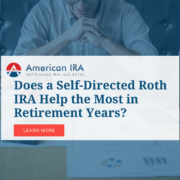Self-Directed IRAs and Borrowing
 Using leverage isn’t for everyone. But if you have experience in a given realm of investing, and you understand the risks, it can be a terrific move. In fact, leverage has historically been a key driver of ROI (return on investment) in a number of investment fields – especially real estate. Most of the information here will have direct applicability to those who own or want to own self-directed real estate IRAs. But the information also applies to anyone for whom leverage is an element of their retirement investing strategy.
Using leverage isn’t for everyone. But if you have experience in a given realm of investing, and you understand the risks, it can be a terrific move. In fact, leverage has historically been a key driver of ROI (return on investment) in a number of investment fields – especially real estate. Most of the information here will have direct applicability to those who own or want to own self-directed real estate IRAs. But the information also applies to anyone for whom leverage is an element of their retirement investing strategy.
Is Borrowing Within a Self-Directed IRA legal?
Absolutely. IRA’s are allowed to borrow money to invest – or even just to have some extra cash to sit on. However, Self-Directed IRA owners need to understand and comply with some basic, commonsense rules:
- You cannot personally lend money to your IRA. Nor can your spouse, children, grandchildren, parents or grandparents. Nor can any entity they control.
- Conversely, you cannot borrow money from your IRA, nor can any of the individuals listed above. Yes, your IRA can lend money at interest as well as borrow. Just not to these people, as it creates an opportunity for a conflict of interest.
- Your IRA may borrow money from a third party finance company, or even an individual, as long as it’s not one of the prohibited individuals named above.
- If someone advises you in a fiduciary capacity on your IRA, they are also a prohibited counterparty. Your IRA may not borrow from or lend to them, nor to any entity they control.
- Loans to your IRA must be on a strictly non-recourse basis. This means that the lender cannot secure the loan with a claim on any collateral outside of the IRA itself. They cannot reserve the right to come after you, personally, or your assets, if the IRA should default. They may, however, press a claim against the property itself, though generally not against other property within the IRA. You cannot be personally liable for the loan.
Taxation of Self-Directed IRAs That Use Borrowed Money
If you borrow money within your IRA and the IRA increases in value, you could generate liability for a special tax. Income in IRAs attributable to borrowed money is subject to unrelated debt-financed income tax. You can defer taxes on profits attributable to your own contributions within an IRA, but you can’t defer taxes on profits attributable to borrowed money. Speak with your tax advisor for more information on how this tax may affect you personally.
If you want to take advantage of self-directed retirement accounts, you may consider establishing a self-directed 401(k) plan, and holding leveraged assets within that plan instead of an IRA. This is because self-directed 401(k)s are not subjected to the unrelated debt-financed income tax.
For more information about the self-directed 401(k) or the real estate IRA, contact us directly at 866-7500-IRA(472).
Credit Available To Self-Directed IRAs
Each finance company is free to set its own terms and conditions. However, we have found that the minimum down payment level for relatively stable investments like real estate is about 30 to 35 percent. For some kinds of investments, such as condominiums, a lender may ask for a down payment of as much as 40 percent, which means the initial loan to value ratio is 60 to 65 percent.
Loans are available for everything from 30-day “bridge” loans to up to 25-year mortgages. Interest can be fixed or variable.
Costs and Fees for Self-Directed IRA Loans
Again, every lender has different rules, but generally there are some fees and costs associated with borrowing within Self-Directed IRAs. For example, North American Savings Bank, one of many lenders active in the Self-Directed IRA space, charges the following fee structures as standard:
- 1 percent origination fee
- $385 percent underwriting fee
- $310 processing fee
- $16 flood certification fee
- $510-$595 appraisal fee
- $200 attorney review fee
That’s on top of things like recording fees, settlement/escrow fees, and other fees or costs that can be deal-dependent. Obviously, mileage varies depending on the plan amount, lender and type of deal. In some cases, you may also encounter charges for hazard insurance and/or taxes.
What Do You Need to Apply?
You’ll need to have the lending fees available, plus as much information as you can about any properties or other assets within the IRA that will be securing the loan. For example, you may need copies of signed leases or rent rolls. You will probably also need a recent IRA account statement detailing reserves available.
You should also include a purchase contract for the property, signed by both you and your third-party Administrator. That’s where American IRA, LLC comes in. We are an administrator specializing in Self-Directed IRAs and other retirement accounts. Our role is to act as an intermediary to ensure IRA transactions occur at arms’ length, to facilitate transactions, and to help you and your investment and tax advisors ensure that all transactions and counterparties are legal, and to assist you and your advisors in ensuring that your actions do not generate unnecessary taxes or fees, and don’t endanger the tax-favored status of you Self-Directed IRA or other retirement account.
For more information, call us at 866-7500-IRA (472). We will be happy to send you our complimentary guide to Real Estate IRA investing, and any of our six other guides as may be of interest to you. Or visit us online at www.americanira.com. We look forward to serving you.
Image by: presentermedia.com




